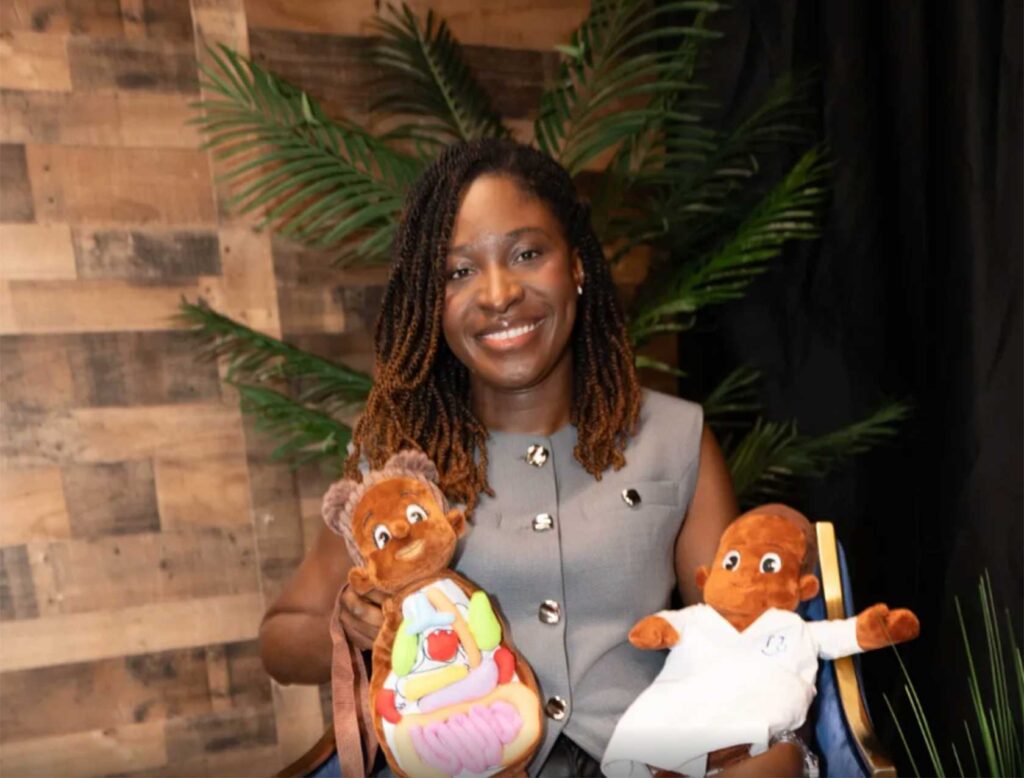
According to the National Institutes of Health (NIH), Black women comprise less than 3% of active physicians in the United States, but Atlanta-based ER physician Dr. Maxine Owusu is on a mission to increase diversity in health care. For her, that mission begins with the children.
STEM Kiddos is a plush human anatomy toy, created by Owusu, that aims to be a fun, visual aid for children to learn the names, locations, sizes, and shapes of the main body organs. It also acts as a backpack so kids can continue their learning from the comfort of their homes to the halls of their school/daycare.
Owusu is also the author of “Curious Rosie: A Trip to the Hospital,” the first book of a series that introduces young readers to the diverse and vital roles of health care professionals. In the book, all the physicians are women of different ethnicities.
Through partnerships with schools and nonprofits, Owusu is igniting a passion for health care — a passion that also started in her youth and carried on into motherhood.
From an early age, Owusu knew that she wanted to be a doctor, but she said she didn’t understand the gravity of what that truly meant until she was in her pre-med programs. She recalled a meeting with a dean at her school that concluded with the dean discouraging her from applying to medical school. When she talked to other women of color in her program, she realized they had been given the same discouragement.
“I realized at that stage that there were going to be people who were going to discourage me through this journey, and then there would be people who would encourage me. But I knew that this is what I wanted to do, so I was going to be steadfast. I was going to do the work that I need to do, and I didn’t care who was going to be there to discourage me. I was just going to forge through and accomplish my goals.” Now she is one of 3,000 Black doctors in the metro Atlanta area, during a time when there is a critical need for more Black physicians.
Owusu noted the health disparities that exist among Black and brown communities, including increased rates of medical conditions such as hypertension, diabetes and stroke.
“There’s a lot of reasons for that. Unfortunately, one is structuralized racism. We don’t have enough access to care … even access to healthy food with all these food deserts. There’s also a lot of distrust when it comes to the Black community when it comes to seeing physicians because of what’s happened in the past.”
From the Tuskegee Syphilis Study to the theft of Henrietta Lacks’ cells, history shows the eroded trust that exists in the medical field. However, multiple studies show that Black patients receive better care when treated by Black physicians, resulting in better health and lower mortality.
Her goal is to increase the number of Black physicians that exist in health care and academics by bringing more awareness to these disparities and educating the Black community. Her experiences training in New York City, which has a large immigrant population, showed her the pressing need for cultural competency and led her to take her experiences beyond the hospital walls by partnering with nonprofits and talking on health panels.
Owusu said she hopes she can continue to create an impact, and if she’s able to change one child’s life, she’ll know she fulfilled her purpose.
“I understand that when you start early, it makes a larger impact for the future when other children see that, ‘Oh, man, I want to do this. I can do this too because she looks like me.’ So it’s just been a fuel,” she said
“I love the fact that we are starting to see more representation in medicine, as well as other spaces. What I hope is that through more awareness, through things like what I’m doing, even with STEM kiddos and this book, we can just harness more interest in medicine and within the STEM field, as well as other industries, that we can get more children interested in these things as they’re starting to see that this is fun.”
This article appeared first on The Atlanta Voice.






